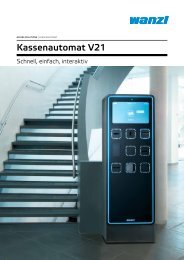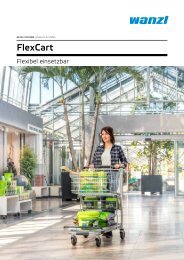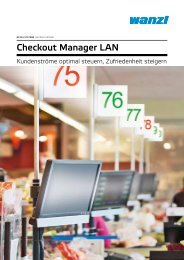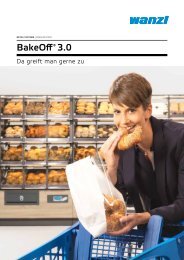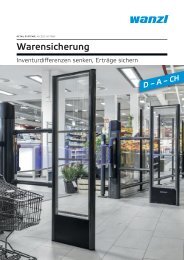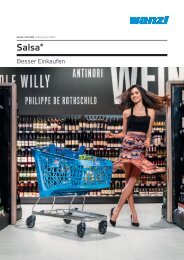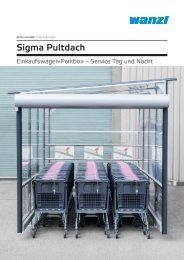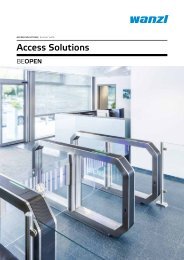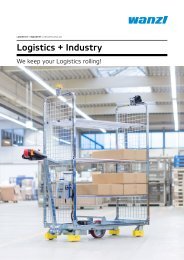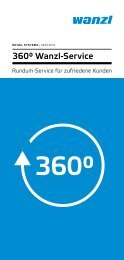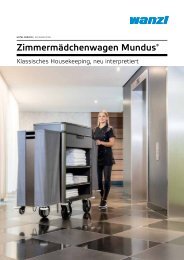WORKBOOK
Erfolgreiche ePaper selbst erstellen
Machen Sie aus Ihren PDF Publikationen ein blätterbares Flipbook mit unserer einzigartigen Google optimierten e-Paper Software.
des Wirtschaftens, in der es immer weniger um Produkte oder<br />
klassische Dienstleistungen, sondern um Meta-Services geht.<br />
and traditional services, and more about meta-services.<br />
Die neue Ära real-digitaler Identität<br />
Meta-Services sind komplexe Unterstützungsleistungen. Sie unterstützen<br />
uns immer dann, wenn wir es wollen. Sie werden uns in<br />
Zukunft begleiten, wohin wir auch gehen. Sie werden da sein, egal<br />
in welcher Situation wir uns befinden, sie werden uns umgeben<br />
wie die Luft: übergreifend, allgegenwärtig, unaufdringlich. Zwei<br />
Gründe sind dafür verantwortlich. Zum einen hat die Massengesellschaft<br />
ausgedient. Die modernen Lebensmuster sind hochgradig<br />
individualisiert. Zum<br />
„In den nächsten Jahren<br />
wird jedes Gerät ans<br />
Netz gehen. Der Trend<br />
wird jede Branche und<br />
jeden Lebensbereich<br />
erfassen.“<br />
anderen treten wir in<br />
eine Ära real-digitaler<br />
Identität ein, umgeben<br />
von technologischer<br />
Intelligenz. Vernetzung<br />
ist keine Hexerei mehr,<br />
sondern Grundvoraussetzung<br />
unserer Existenz<br />
– wie fließendes<br />
Wasser und Strom aus der Steckdose. Bis 2020 sollen laut einer<br />
Prognose von Cisco 50 Milliarden Geräte vernetzt sein, das bedeutet,<br />
auf jeden Menschen weltweit kommen circa 6,5 vernetzte<br />
Geräte. „In den nächsten Jahren wird jedes Gerät ans Netz gehen.<br />
Der Trend wird jede Branche und jeden Lebensbereich erfassen“,<br />
ist sich Dave Evans, Chief Futurist bei Cisco, sicher. Via Smartphone,<br />
Laptop und anderen digitalen Geräten bewegen wir uns dann<br />
in einem Echtzeit-Datenfluss. Dies ermöglicht uns von überall,<br />
nicht nur Empfänger, sondern auch Sender zu sein und Wünsche<br />
situativ mitzuteilen.<br />
Geolokale Informationen werden zu Bewegungsmustern, Kaufvorgänge<br />
zu Ernährungsgewohnheiten, Mediennutzung zu Interessensgebieten.<br />
So entsteht eine schnell wachsende digitale<br />
Identität, die unsere herkömmliche, „reale“ Identität erweitert<br />
und ergänzt. In dieser Me-Cloud mit all ihren Logfiles des individuellen<br />
Lebens liegen unvorstellbare Chancen für neue Angebote.<br />
Kluge Unternehmen nutzen dies, um ihren Kunden individuelle Lösungen<br />
zu bieten, die weit über bestehende Angebote hinausgehen:<br />
Meta-Services. Ein plakatives Beispiel für diese Entwicklung<br />
liefert eine innovative Anwendung aus der Finanzbranche: die Property<br />
Guide App der Commonwealth Bank of Australia, die sich<br />
an Immobilieninteressenten richtet. Wer an einem zum Verkauf<br />
befindlichen Haus vorbeiläuft, kann dieses mit seinem Smartphone<br />
abfotografieren. Die App filtert dann aus der Datenbank des<br />
Finanzinstituts das dazugehörige Angebot heraus – versehen mit<br />
Preis, Nebenkosten und Steuern. Weiterhin analysiert die App die<br />
finanzielle Lage des Interessenten, prüft die Kreditwürdigkeit und<br />
macht ein Angebot zur Finanzierung. Was früher eine ganze Reihe<br />
von Telefonaten und Terminen erfordert hätte, wird nun just in<br />
time, individuell per Knopfdruck geliefert.<br />
The new era of real/digital identity<br />
Meta-services are complex support services. They provide assistance<br />
when it is required. They will be with us wherever we go in<br />
the future. They will be there whatever situation we are in, surrounding<br />
us like the air – all-encompassing, omnipresent, unobtrusive.<br />
There are two reasons for this. On the one hand, the concept<br />
of mass society has run its course. Modern lifestyles are highly<br />
individualised. On the other hand we are entering an era of real/<br />
digital identity, surrounded by technological intelligence. Networking<br />
has grown from a form of witchcraft to a basic foundation<br />
of our existence,<br />
„Every device will be linked<br />
to the net in the years to<br />
come. This is a trend that<br />
will affect every industry<br />
and every aspect of our<br />
lives.“<br />
like running water<br />
and electricity from<br />
the socket. Cisco<br />
forecasts that 50<br />
billion devices will be<br />
networked by 2020,<br />
or about 6.5 networked<br />
devices for<br />
every person in the<br />
world. “Every device will be linked to the net in the years to come.<br />
This is a trend that will affect every industry and every aspect of<br />
our lives” says Dave Evans, Chief Futurist at Cisco, confidently.<br />
We will then operate within a real-time flow of data via our smart<br />
phones, laptops and other digital devices. This will enable us to<br />
act not just as recipients but also as senders, and communicate<br />
preferences on a situational basis.<br />
Geopositioning information is used to identify movement patterns,<br />
purchases provide clues as to our eating habits, and our<br />
use of media reveals our areas of interest. This results in a rapidly<br />
ballooning digital identity that adds to and supplements our traditional,<br />
“real” identities. This “me” cloud with all of its log files on<br />
our individual lives presents unimaginable opportunities for new<br />
offerings. Smart companies take advantage of this to offer their<br />
customers individual solutions that go far beyond existing offers,<br />
i.e. meta-services. One striking example of this trend is the Property<br />
Guide App offered by the Commonwealth Bank of Australia,<br />
an innovative application from the financial sector aimed at those<br />
interested in buying real estate. Anyone who spots a house that<br />
is for sale can take a photograph of it with their smart phone.<br />
The app then filters the corresponding offer from the bank’s database,<br />
including the price, ancillary costs and taxes. The app also<br />
analyses the interested person’s financial circumstances, checks<br />
their creditworthiness and makes an offer of financing. Something<br />
that would previously have required a series of telephone<br />
calls and meetings is now provided just in time to the individual<br />
at the push of a button.<br />
Abschied von linearen Konsummustern<br />
Aus dem Lebensmittelhandel lassen sich derlei ganzheitliche Beispiele<br />
noch nicht benennen, weshalb zur Verdeutlichung auf die<br />
Finanzbranche zurückgegriffen wurde. Übertragen auf den LEH<br />
bedeutet diese Entwicklung, hoch-vernetzte Einkaufslösungen zu<br />
bieten, die nicht mehr den klassischen, linearen Mustern folgen.<br />
Die Ernährungspsychologin Hanni Rützler drückt es folgendermaßen<br />
aus: „Der Constant Consumer von heute will nicht planen, einkaufen,<br />
konsumieren, er will die passende Koch- und/oder Esslösung.<br />
Wenn wir z. B. eine Lebensmittelbestellung per Smartphone<br />
im Bus abgeben, wenn die Lebensmittel am Arbeitsplatz zugestellt<br />
werden, wenn wir im Internet nach dem Lesen der Restaurantkritik<br />
nicht nur einen Tisch bestellen, sondern auch gleich das<br />
passende Kochbuch und die Kochbox mit dazu oder wenn wir nach<br />
The end of linear patterns of consumption<br />
The above example was taken from the financial sector for the<br />
purpose of illustration because there are no such comprehensive<br />
examples from the food retail industry at present. If we apply<br />
the concept to food retail, this trend means offering highly networked<br />
shopping solutions that no longer follow the traditional,<br />
linear patterns. Nutritional psychologist Hanni Rützler puts it like<br />
this: “Today’s constant consumer doesn’t want to plan, shop, and<br />
consume - he or she wants the appropriate cooking and/or eating<br />
solution...If for example we order groceries on the bus using our<br />
smart phone, if groceries are delivered to our workplace, if, after<br />
reading a review of a restaurant, we don’t just want to reserve a<br />
table but also want to order the corresponding cookery book and<br />
the cookery box to go with it, or if we want to take the pasta and<br />
254





